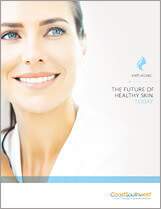The global anti-fatigue cosmetics market is expected to hit a total worth of $18.9 million USD by 2025, at a projected CAGR of 4.5% over the forecast period.
The top three drivers behind this projected market growth? Intensifying levels of consumer stress and increasingly hectic lifestyles, boosted interest in natural claims ingredients that can fight fatigue, and innovative formulations that address the common physical symptoms of exhaustion.
Anti-fatigue products
Anti-fatigue personal care products are designed to relieve, remedy, and correct the telltale signs of sleep deprivation, stress, and exhaustion. Products typically focus on hydrating and plumping up the skin, reducing dark circles or puffy eye bags, brightening dull, tired complexions, and shrinking enlarged pores.
Another hallmark of anti-fatigue products? Claims like energizing, invigorating, nourishing, brightening, and reviving.
So far, creams create the largest revenue slice of this market, with overnight moisturizers, under-eye creams, and under-eye primers the most popular products in the anti-fatigue category, since 2018.
However, moving ahead, experts predict the anti-fatigue market will grow by encompassing both skincare items that treat tired skin and more makeup products that hide and correct symptoms.
Stressful lifestyles are on the rise
The top driver behind the accelerating anti-fatigue product market? Increasingly stressed out consumers, who are battling skincare issues that are only exacerbated by modern aggravators like pollution, frequent travel, blue light from devices, and lack of sleep.
The results of stress on the skin are well-documented. In a recent student published in the Journal of Sleep, the faces of sleep-deprived individuals were perceived as having demonstrably worse skin and physical appearances. The unpleasant side effects of not enough snoozing? Red eyes, more swollen eyes, more hanging eyelids, a prevalence of darker or discolored circles under the eyes, a pale and uneven skin tone, the increased appearance of wrinkles and fine lines, and droopier skin. To sum it all up: more tired, older-looking skin.
As more and more consumers express concern about their raising levels of stress, it’s clear the need for cosmetics that address the physical signs of fatigue and sleep deprivation will only increase.
The popularity of natural ingredients
Anti-fatigue cosmetic products are also growing in popularity, thanks to their reliance on natural ingredients that can liven up the complexion.
Some of the most trendy natural anti-fatigue ingredients include:
- Caffeine – constricts the blood vessels and reduces inflammation and puffiness.
- Matcha green tea – a natural antibacterial agent, matcha contains high levels of epigallocatechin gallate, which helps soothe inflammation and combat acne.
- Ginseng – a powerhouse antioxidant, ginseng helps slow cell aging.
- Papaya – packed with Vitamin A, this bright orange fruit helps remove dead skin cells and brighten dull skin.
- Kelp – with a natural high iodine content, kelp can help hydrate dry, flaky skin.
Anti-fatigue formulations will fall neatly in line with the overall growing desire for greener skincare and makeup products.
As consumers continue to push the natural personal care market ahead, anti-fatigue formulations will fall neatly in line with the overall growing desire for greener skincare and makeup products.
Innovative formulations
The final driver behind the booming anti-fatigue market is the recent wave of innovative formulations and products that fall under the anti-fatigue banner.
Some of the more viral and popular anti-fatigue products include sleeping masks, or facial masks designed to “repair and rejuvenate” the skin over the course of the night. Additionally, under-eye patches to reduce bags, lines, and circles are also especially exciting to consumers, as these highly Instagrammable products are often soaked in moisturizing active ingredients that provide an instant boost to the skin.
On the makeup side, products that focus on covering up the signs of signs of fatigue, especially under the eyes, are faring best in anti-fatigue market. Products that highlight claims of illuminating and brightening are also especially enticing to sleep-deprived consumers, as these cosmetics can help turn dull complexions into the dewy, radiant skin currently en vogue.
Peeling away fatigue with new products
Consumers are sleep-deprived, stressed-out, and just plain tired. The anti-fatigue market represents an excellent chance to help soothe the physical and emotional fatigue associated with today’s current lifestyle and provide innovative, revitalizing products to create better, happier-looking skin.




